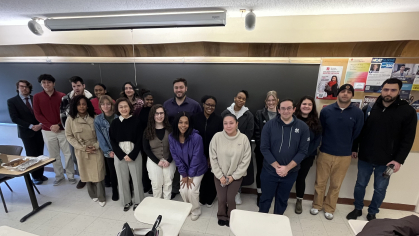By Shreya Gupta
Kathryn Campbell is an MSW student and Big Ten Division I athlete. We recently had the opportunity to speak with her about each of her responsibilities and how she strikes a balance between them.
Q: Can you share a bit about your background?
A: I finished my undergraduate studies at Rutgers with a B.A. in psychology while minoring in criminology. During the beginning of my senior year, I was unsure of which graduate program I wanted to pursue. I knew I wanted to continue with higher education to expand my knowledge, but having so many options at my disposal made it a difficult choice. Being the versatile individual I am, I could see myself excelling in many of the programs that Rutgers offered. However, I started looking more into the MSW program and was immediately drawn to the clinical social work specialization. Mental health has always been an area of interest to me, as I have both experienced first-hand and witnessed the dire need for more attention to this issue. I realized that through social work I would have the potential to help create a platform for marginalized voices to be amplified, and at that very moment I understood my calling.
Q: How did you become a member of the Rutgers women’s track and field team as a javelin thrower?
A: Javelin was an event that I stumbled upon after one of my high school gym teachers witnessed my “cannon of an arm” and insisted I try out for spring track and field. I traded softball cleats for some javelin spikes, and everything just clicked for me from that point on. I performed very well during high school, and this opened the door to offers from Division 1 schools. After having a bumpy start to my collegiate career at a different university, I found myself entering the NCAA transfer portal going into my sophomore year. Once my release forms were signed, I was able to communicate with coaches around the country. Soon enough, I found myself getting in contact with the head coach of the women’s track and field team at Rutgers. I was thrilled with the idea of being at a state university that valued athletics that was eager help me reach my full potential.
Q: What does being a Big Ten Division I athlete mean to you?
A: To me, being a Big Ten Division I athlete means devotion, dedication, and determinacy. There is a lot of sacrifice involved, but it is well worth the reward of proudly brandishing the Scarlet R across your chest. The Big Ten is a very competitive conference, and each and every one of us has to be prepared to show up at our meets. I also believe that a big part of being a Big Ten athlete is resilience, and this was surely tested with the COVID-19 pandemic. After losing a year of competition and being stuck in our homes for months on end, we all had the choice of accepting the circumstances as they were or finding a way to work around it. Sure enough, my teammates and I did just that, and we pushed through making sure our comeback was twice as good.
Q: How do you balance your responsibilities as an MSW student and an athlete? Do you have any tips for other students involved in extracurricular activities?
A: Between school, athletics, field placements, and work, I have quite a lot going on in my day-to-day schedule. Time management is crucial for me right now, as I want to make sure I am allocating my time and energy appropriately. I sometimes find I am
spreading myself thin to meet the demands of my responsibilities. However, as soon as I recognize this is happening, I try to dedicate whatever free time I have to activities that bring me joy. I suggest that those of you finding yourself in similar circumstances do the
same! At the end of the day, if you are mentally and physically drained, you will not find yourself performing up to par. Take the time to relax and reset!
Q: How has it been navigating these experiences during the COVID-19 pandemic?
A: It has been tough to say the least -- these are truly odd times. I have spent far too many hours behind a bright computer screen, alone in my room. Even though everyone is enduring some of the same dilemmas, it has been much more isolating than I ever anticipated. Not being able to walk into a lecture hall and have in-person learning was absolutely something I took for granted. It is so strange having to see small faces float across my laptop screen rather than having peers sitting to left and right of me. I am beyond thankful for the opportunity to compete as a fifth-year track athlete during these times, as this has allowed me to have some sense of normalcy amidst the chaos of COVID-19.
Q: What are your hopes for the future?
A: I am truly excited to see where social work leads me. The knowledge and experience I've gained from this program serve as the necessary tools to create the change I wish to see in the world. I cannot wait to work with all sorts of different demographics and later on discovering my niche communities. So far, I have found a passion catering to individuals in the mental health field while interning at my current field placement at Earth House.
Q: What does your field placement at Earth House consist of?
A: Earth House is a residential treatment facility for individuals diagnosed with schizophrenia and other psychotic disorders. We have a maximum occupancy of 14, and the age range of people who can join the program is 18 and older. At Earth House, we refer to everyone as students, rather than patients, as this terminology aims to move away from the stigmatization of mental illness; they are students because they are learning how to handle their disorder. A large part of this program focuses on building good habits that the students can incorporate into their everyday lives once they are ready for discharge. This includes a well-balanced diet free of caffeine, gluten, and excess sugars, a vitamin regime, and daily exercise. Students also participate in group and individual therapy sessions with the on-site psychologist. I help run group therapy and participate in weekly clinical meetings to discuss students' progress with the rest of the clinical staff. Working with the students has been a rewarding experience, to say the least. I have witnessed people who arrived feeling hopeless make a complete 180 after fully investing themselves in the program. It is amazing to see what proper medications and lifestyle changes can do for these individuals living with chronic mental illness; I am so happy to be a part of their journeys. I have also seen how, for some, schizophrenia is a never-ending battle with far more downs than ups. Working with chronic mental illness has been an eye-opening experience for me. Interacting with students firsthand has helped me build on several skills that we practice in social work, such as empathy and cultural competency. Even though I am finishing out the internship, I plan to continue working at Earth House as there is so much more for me to experience and learn being there.
Q: Is there anything you would like to share with your fellow students?
A: This past year has tested our limits and boundaries as students. I am proud of every last one of you for pushing through all the physical and emotional turmoil that has been brought about by the pandemic. To anyone that has endured a loss or hardship, my heart goes out to you. To anyone struggling, trust that you will prevail



